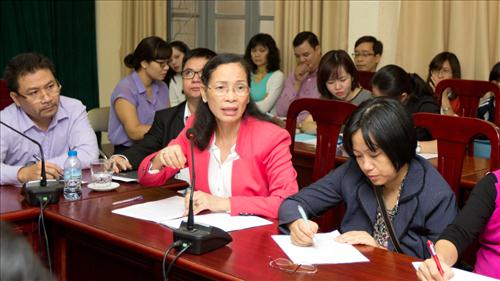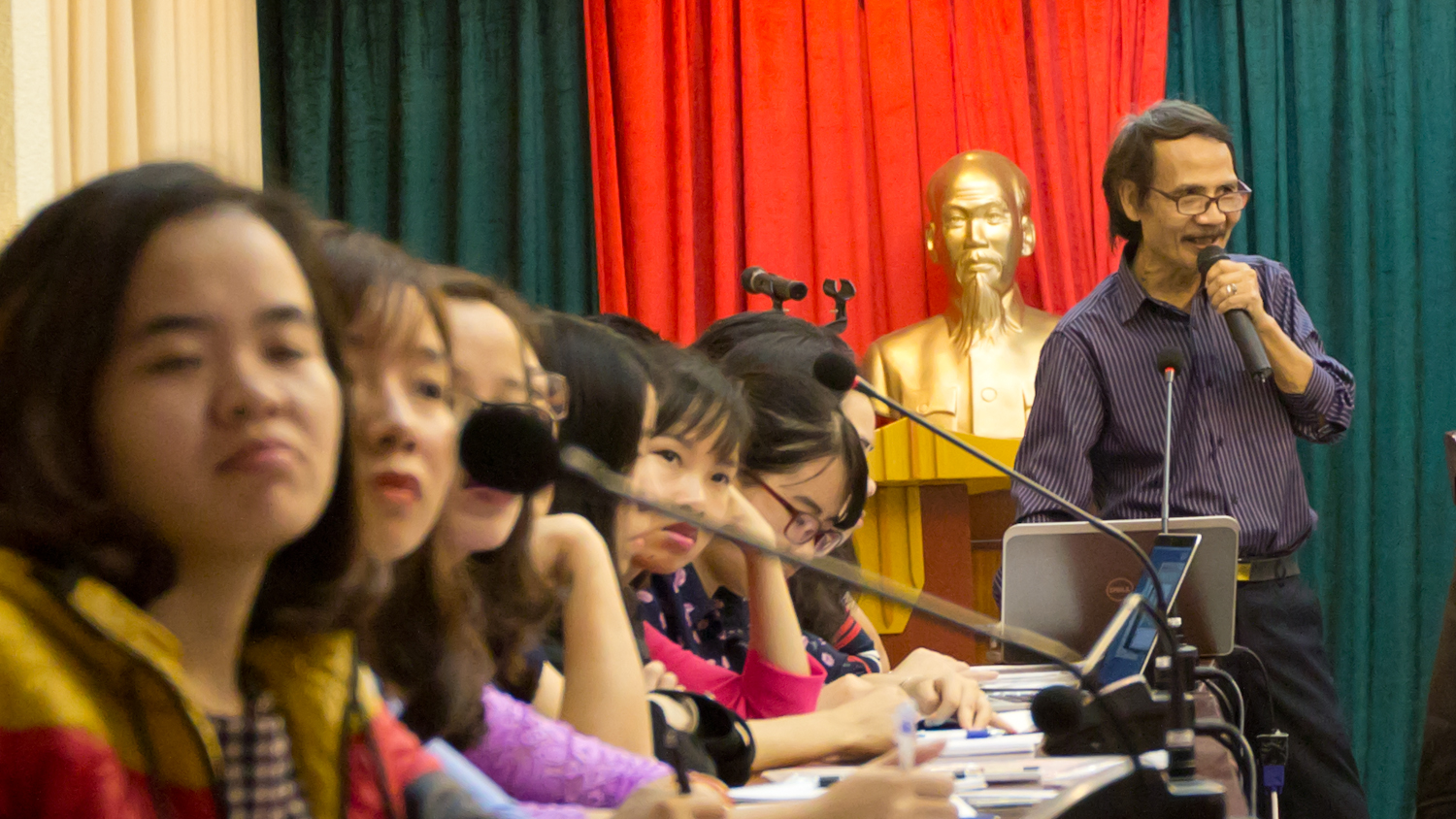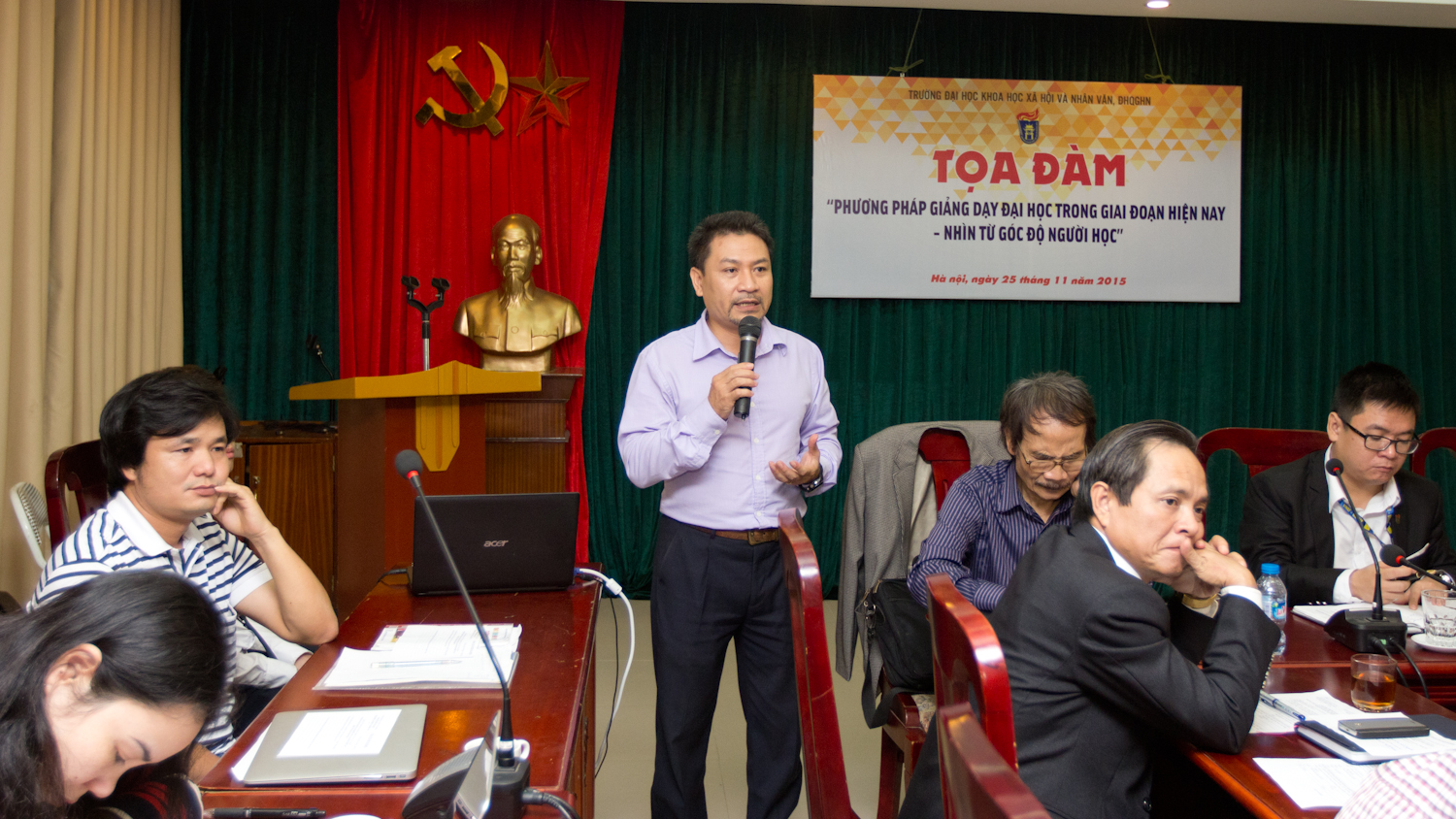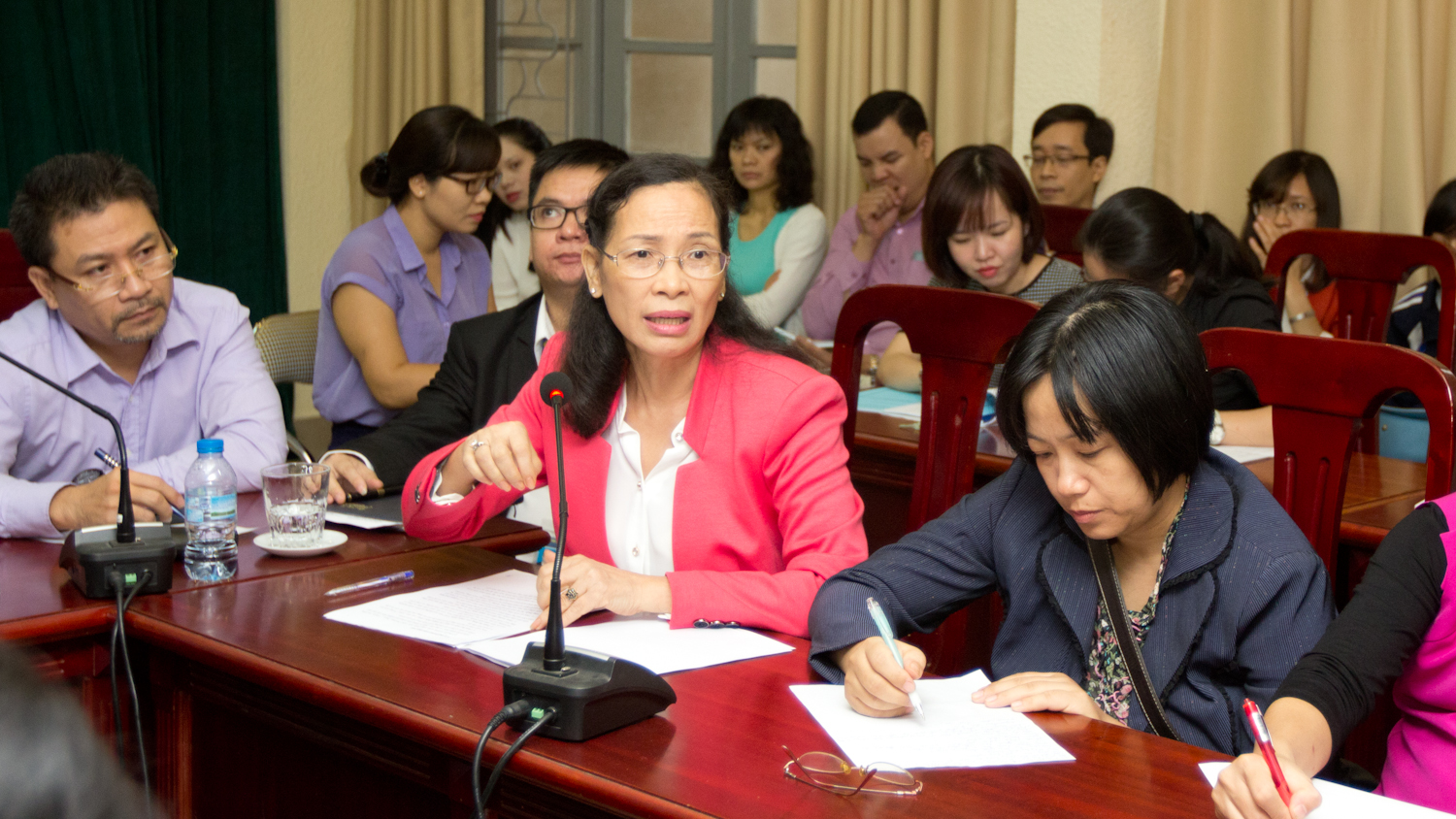

Professor Dang Canh Khanh (Director of the Institute for Traditional and Development Studies) is sharing his insights on the topic "Value Orientation of Students in the Current Period".
It is necessary to recognize and properly evaluate learners.
In his lecture on the topic "Value Orientation of Students in the Current Period," Professor Dang Canh Khanh (Director of the Institute for Traditional and Development Studies) emphasized the transformation of today's youth. According to him, when talking about today's youth, keywords include creativity, innovation, uniqueness, a desire to strive for excellence, and a willingness to break free from old conventions.
According to Professor Dang Canh Khanh, the education of young people should not involve cramming too much knowledge into their heads. Instead, there should always be room in their minds so that they can easily connect existing knowledge and absorb new, necessary knowledge.
From a psychological perspective, Professor Tran Thi Minh Duc (Head of the Counseling Psychology Department, Faculty of Psychology) offered important insights into approaching the ethical behavior of students according to different stages. According to the professor, when examining students' behavior, specific assessments of their behavioral and ethical development are necessary.
Professor Tran Thi Minh Duc offered several insightful perspectives on the learning mindset of current students, such as: Students are adults, and we should encourage them to independently pursue their studies and research. Furthermore, students possess strong cognitive abilities, so we can expand their knowledge by linking fundamental theoretical knowledge with practical applications.
Combine students' diverse experiences to create student-centered definitions; this will help students remember the material for longer. Always encourage students to speak up; their participation is more important than whether they are right or wrong. When engaging with the lecturer, students will inevitably feel a lack of confidence; identify and encourage them to overcome this. This encouragement can be based on appropriate methods, ensuring the organization is suitable to the psychology of that group, shared Professor Tran Thi Minh Duc.
According to Dr. Ton Quang Cuong (Head of the Faculty of Education, University of Education), the most appropriate method is only considered within a system that considers: who are the learners, what do they need, how do we understand them, and how do they learn?
According to Dr. Ton Quang Cuong, the essence of teaching is accompanying learners so that they can accomplish something. This involves applying the content to practice, which is different from simply having learners repeat what we teach.
In the topic "Some current university teaching methods and the effectiveness of applying those methods," Dr. Ton Quang Cuong also introduced some current teaching methods such as problem-solving-based learning, discovery learning, cooperative learning, experiential learning, etc.

Dr. Ton Quang Cuong (Head of the Faculty of Education, University of Education) shared some current teaching methods.
Multiple solutions from the learner's perspective.
Ms. Thuy Hang (Department of Philosophy) raised the issue ofThe difficulties in conveying concepts in theoretical subjects like philosophy.?
Dr. Ton Quang Cuong (Head of the Faculty of Education, University of Education) shared: "Today's learners are very intelligent. With the essential knowledge of basic science, we should apply it to practice, using examples linked to reality to inspire learners."
Sharing his concerns about the difficulties faced by new university students who are already confronted with many dry, theoretical subjects, Dr. Ton Quang Cuong suggested that perhaps some of these subjects should be moved to the third year's semesters, which would be more appropriate. This opinion received many dissenting responses from delegates at the seminar.
Share aboutThe difficulty in credit-based classes arises when students come from diverse academic backgrounds.This leads to different approaches to psychology, so which method is appropriate? Ms. Lien (Philosophy Department) wondered.
According to Professor Tran Thi Minh Duc: It's impossible to distribute knowledge evenly among all students in a class. To address this, lecturers should discuss with students the target audience for the course – which year of study it's suitable for, what prior knowledge is required, etc. Students who haven't met those requirements will need to make a significant effort to keep up with the course.
Of course, instructors should also keep a list of younger students who are not yet a good fit for the target group, so they can take note of them to help and encourage them to ask further questions. This assessment is only relative, as students' abilities vary, shared Professor Tran Thi Minh Duc.
Professor Tan (Department of Linguistics) shared: Many students haveStudents often lack understanding of the purpose of studying these subjects, especially basic sciences. So how can we influence and change their thinking and behavior??
Analyzing the psychology of students, Dr. Nguyen Quang Lieu (Department of Politics and Student Affairs) shared: The psychology of students goes through 6 stages: from fear to reluctance -> acceptance -> voluntariness -> interest -> passion; while for staff, the psychological process is from compulsion -> voluntariness -> passion for teaching. The ultimate goal is the passion of the teacher, which in turn fosters the passion of the students.
Lecturers should pay attention to the introductory chapter of the lesson, as this chapter provides the subject matter, objectives, significance, and teaching methods of the course. This chapter helps students gain a comprehensive overview of the subject, something that many teachers often lack.
Furthermore, during the teaching process, core content should be emphasized, as it is very important and meaningful for students. Attend diverse classes to glean your own experiences, shared Dr. Nguyen Quang Lieu.
Professor Thanh Tung (Faculty of Political Science) shared his teaching experience: Students usually pay attention to three things: the lecturer telling funny stories; content related to the exam; and content related to the students' future lives. So,How much information is enough for the third section, which relates to the practical work that students will do later??
According to Professor Dang Canh Khanh, lecturers need to strike a balance between qualitative and quantitative aspects, and then apply this to their lectures appropriately. They should avoid getting too caught up in extraneous knowledge content and neglecting to provide essential foundational knowledge.
Professor Tran Thi Minh Duc offered more flexible suggestions on this issue. According to the Professor, students have different backgrounds; for first-year students, lecturers can introduce more career opportunities, while for final-year students, the focus should be on equipping them with knowledge and skills.
In addressing life's challenges, before instructors impart knowledge, they need to consider student feedback. Students must possess sufficient knowledge and understanding to effectively provide the necessary information for life. According to Professor Tran Thi Minh Duc, a teacher who lacks interest in the subject will find it difficult to deliver a compelling lesson.

Professor Tran Thi Minh Duc (Head of the Counseling Psychology Department, Faculty of Psychology) shared her insights at the seminar.
Ms. Huong (Faculty of Oriental Studies) categorized students in her class into three groups: active, hesitant, and indifferent to the learning content. The lecturer tried various methods to stimulate learning in the hesitant and indifferent groups, but the changes were not significant in the learning environment. However, follow-up results after graduation showed that all three groups had good jobs and good skills.So, is the method the instructor uses effective? Is there a way to quantify the effectiveness of the teaching method??
In his analysis of this issue, Dr. Ton Quang Cuong argued that "students who participate well in learning may not necessarily have good motivation, and vice versa." He pointed out that student participation varies greatly, and maintaining enthusiasm in a group setting is difficult. Therefore, instructors should strive to do their best to create the most conducive learning environment for students.
Sharing the same viewpoint, Professor Tran Thi Minh Duc also gave an illustrative example: "How many people are needed to move a potato if it doesn't want to move?", suggesting that lecturers shouldn't feel too guilty about that issue.
"Of course, the students are never at fault; the fault lies only with the teachers. Lecturers shouldn't just transmit their knowledge, but rather what the students need, so the method is crucial," shared Professor Phan Kien (Faculty of Journalism and Communication).
Contrary to Professor Kien's viewpoint, Professor Nguyen Quang Lieu offered a perspective on harmonizing the lecturer's knowledge with the students' needs. According to Professor Lieu, before discussing the students' attitudes, we need to consider the lecturers' attitudes. Professor Nguyen Quang Lieu stated, "If teachers want their students to be serious, they must first be role models of seriousness. As for the students, they always enjoy learning because learning is about solving future problems, about making a living later in life."
Author:Dinh Hau
Newer news
Older news